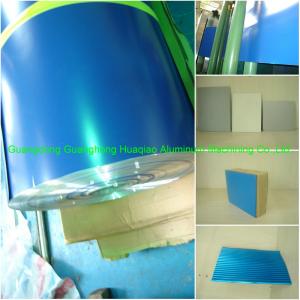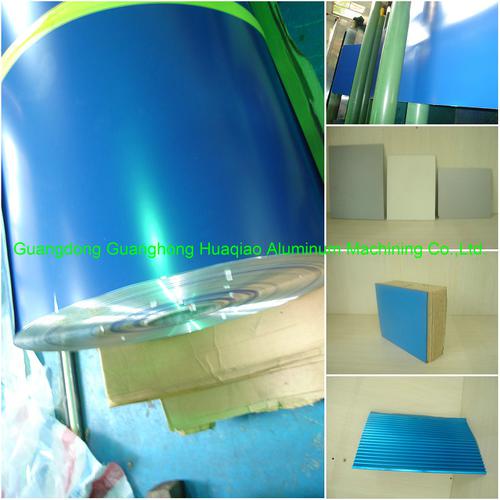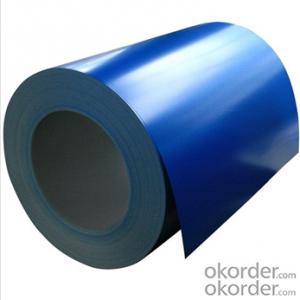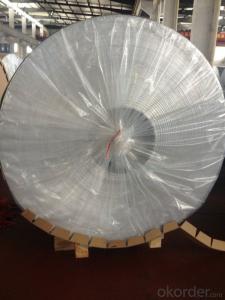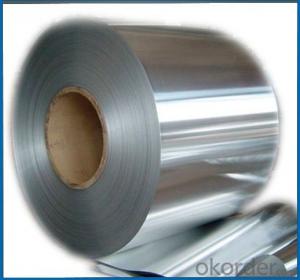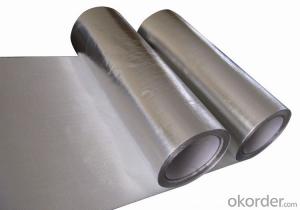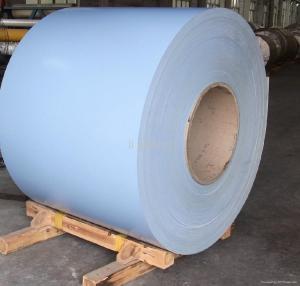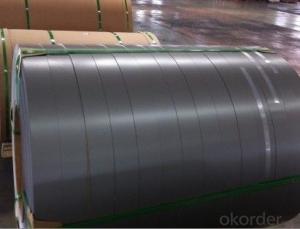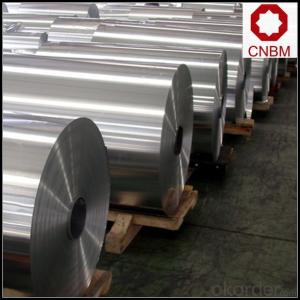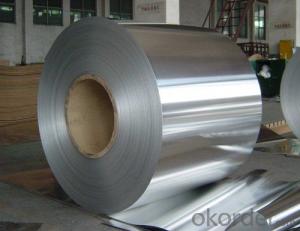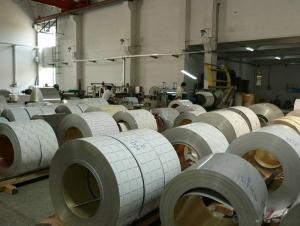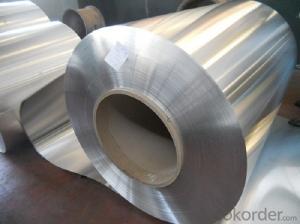Blue Color Coated 6061 T6 Aluminum Alloy Coil
- Loading Port:
- China Main Port
- Payment Terms:
- TT OR LC
- Min Order Qty:
- -
- Supply Capability:
- -
OKorder Service Pledge
OKorder Financial Service
You Might Also Like
Color coated aluminum coil is a material with excellentacid-resistance and alkali-resistance. The coating layer is even with brightcolor to last for a very long time. It is a green decoration material with thecharacters of environment protection, flame-resistance, and groovy colors. In nowadays, the color coated aluminum coil has become the popularmaterial for top grade decoration. With our advanceprofessional aluminum coated technique, we can custom various aluminum coils,like coated aluminum coil , Color coated aluminum coil , embossed aluminumsheet with the color and size which you demands.
1) Process: pre-treatment,continuous painting and baking for times .
2) Material: high qualitymaterial, aluminum sheets from South West Aluminum Industry Company in China,pre-treatment material from Henkel & Chemtell from Germany, more than 70%of PVDF coating from PPG Corp., the USA and polyester from Sweden BeckerIndustrial Coating Co., Ltd.
3) Our products can keepexcellent quality and stability.
4) Thickness: 0.06 - 1.0mm;width: 20 - 1,590mm
PE Aluminum Coating Coils for ACP
Features of PE Aluminum Sheet:
1. Adopting precision rolling coatingtechnology, our PVDF and PE coated coil can ensure excellent adhesive withoutcoating omission.
2. For the PE coated aluminum coil weproduced, there are various colors for your choice.
3. Using infrared heating technology toprotect environment from pollution.
4. Our coated aluminum coil has four-rollercoating line, uniform coating thickness and good features.
RawMaterial of the PE Aluminum Coating Coils:
1.Aluminum Coil: high strength aluminum with alloy of AA1100 (aluminum alloy isavailable with AA3003, AA3005, AA5005 according to customer)
2. SurfacePaint: PE, PVDF and special paints.
Specificationof PE Aluminum Coating Coil
Width:20mm~1590mm
Thickness:0.06mm~1.0mm
ExternalDiameter: ≤ 1500mm
InternalDiameter: 405mm, 505mm, 150mm, 75mm
Coilweight: ≤ 4000kg
PE coatedaluminum coil is processed through the technics of roller coating and bakingwith precise polyester paints. Its color is glossy and with variety of colorsenabling you to choose easily. Chromatic aberration is small, impact resistanceis strong and easy to be processed, and all its performance has reached orsurpassed the national criteria. The products are widely used in indoor anddoor decoration, ceilings, room surface tiles, corrugated boards, wall panels, advertisement boards, counters,home appliances, decoration in and out of autos and boats.
Performanceof the coating
Aluminum Thickness | Coating Thickness | MEK | T- Bend | Impact | Adhesion | Pencil Hardness | Boiling Water Proof |
0.3-1.5mm | ≥18μm | ≥100 Times | ≤2T | 50 kg•cm | 0 Grade | ≥HB | no change within 2 hours |
0.2-0.28mm | ≥18μm | ≥100 Times | ≤2T | 30kg•cm | 0 Grade | ≥HB | no change within 2 hours |
0.15-0.18mm | ≥18μm | ≥100 Times | ≤3T | 20 kg•cm | 0 Grade | ≥HB | no change within 2 hours |
0.08-0.12mm | ≥16μm | ≥80 Times | ≤4T | 10 kg•cm | ≤1 Grade | ≥HB | no change within 1 hour |
0.022-0.06mm | ≥12μm | ≥50 Times | - | - | ≤1Grade | ≥HB | no change within1 hour |
Colorof Card
PE (polyester)
PE
ColorMatch
For custom' color requests, we can deal as following:
1. Supply a physical sample of custom color. A color sample on metal ispreferred. If other, it is also acceptable. But the color matching rate may benot good as color on metal.
2. New color sample is usually offered by our paint supplier in 5-7 days,special color should be in 7-10 days.
3. Upon receipt of color sample, please approve in writing as soon as possible.Once you approved, we will arrange purchasing and production.
Note: Color difference maybe occurred in different production batch, so it issuggested all panels are placed in one order for same project. And keep samedirection as arrow on protective film when installing to avoid any colordifference by vision
Applications:
The aluminum coils are widely used in ACP/curtain panel/honey combpanel/shutter/roofing and most of the decoration areas. With the superiorquality and advanced management, our products had been export to Euro/NorthAmerica /East Asia and many other areas and countries.
- Q: This question asks about the environmental friendliness of aluminum coils.
- <p>Aluminum coils are considered environmentally friendly for several reasons. They are highly recyclable, with the recycling process requiring significantly less energy compared to producing new aluminum. This reduces greenhouse gas emissions and conserves resources. Additionally, aluminum is a non-toxic material that does not leach harmful substances into the environment. However, the environmental impact also depends on the production process, which can consume energy and generate emissions. Overall, when properly recycled, aluminum coils have a lower environmental footprint than many other materials.</p>
- Q: Are there any health risks associated with aluminum coils?
- There are some concerns about the potential health risks associated with aluminum coils. Aluminum is a common material used in the construction of coils for air conditioning and refrigeration systems. However, when aluminum comes into contact with certain acids, such as those found in some cooling agents and cleaning solutions, it can corrode and release aluminum ions into the air. Inhaling these aluminum ions may pose health risks, particularly for individuals with respiratory conditions or allergies. Additionally, there have been reports suggesting a potential link between aluminum exposure and certain health issues, such as Alzheimer's disease and breast cancer. However, scientific research regarding this connection is inconclusive and ongoing. It is important to note that aluminum is a naturally occurring element found in many foods, water, and even the air we breathe. It is also used in various consumer products, such as cookware and food packaging. To minimize potential health risks, it is recommended to ensure proper maintenance and cleaning of air conditioning and refrigeration systems to prevent the buildup of corrosive substances. Regularly changing air filters and using appropriate cleaning solutions can help reduce the risk of aluminum corrosion. Additionally, individuals with pre-existing respiratory conditions or allergies may consider consulting with a healthcare professional to determine any specific precautions they should take.
- Q: How do aluminum coils contribute to lightweight vehicle design?
- Due to their unique properties and manufacturing processes, aluminum coils play a crucial role in the attainment of lightweight vehicle designs. Aluminum, being a lightweight material itself and weighing only about one-third of steel, is an ideal choice for lightweight vehicle design. When aluminum is formed into coils, it offers various advantages that contribute to the overall reduction in vehicle weight. First and foremost, aluminum coils possess high formability, enabling the creation of complex shapes using less material. This characteristic allows automakers to design intricate body panels and structural components that are both lightweight and possess improved aerodynamics and fuel efficiency. The ability to shape aluminum coils intricately also provides increased flexibility in design, leading to more innovative and visually appealing vehicle designs. Secondly, aluminum coils exhibit an exceptional strength-to-weight ratio, making them an excellent option for structural components. Despite their lightweight nature, aluminum coils provide exceptional structural integrity, ensuring the safety and durability of the vehicle. By incorporating aluminum coils into the chassis, suspension systems, and other critical components, automakers can reduce weight while maintaining the necessary strength and rigidity required for safe operation. Moreover, aluminum coils possess excellent corrosion resistance, which is vital for the long-term longevity of the vehicle. Corrosion can significantly impact the structural integrity and overall performance of a vehicle. By utilizing aluminum coils, automakers can minimize the risk of corrosion-related issues, resulting in a longer lifespan for the vehicle and reduced maintenance costs. Lastly, the utilization of aluminum coils aids in the overall reduction of vehicle weight, leading to improved fuel efficiency and decreased greenhouse gas emissions. Lighter vehicles require less energy for acceleration and to maintain speed, resulting in enhanced fuel economy. This benefit becomes increasingly significant as the automotive industry strives to develop more sustainable and eco-friendly vehicles. In conclusion, aluminum coils make a significant contribution to the design of lightweight vehicles by offering high formability, exceptional strength-to-weight ratio, corrosion resistance, and overall weight reduction. These properties enable automakers to design vehicles that are not only lighter but also safer, more fuel-efficient, and visually appealing. As the demand for lightweight vehicles continues to rise, aluminum coils play a vital role in achieving these design objectives.
- Q: Can aluminum coils be used for HVAC systems?
- Indeed, HVAC systems can utilize aluminum coils. Aluminum coils are frequently employed in HVAC systems due to their numerous advantages over alternative coil materials. To begin with, aluminum is a lightweight substance, facilitating easier handling and installation. Consequently, this can lead to decreased installation costs and diminished strain on the HVAC system's structure. Furthermore, aluminum coils possess exceptional heat transfer properties. They proficiently transfer heat from the refrigerant to the surrounding air, a critical aspect for the efficient operation of the HVAC system. Additionally, aluminum coils demonstrate a high resistance to corrosion, a quality of particular significance in environments with high humidity or pollutant levels. Moreover, aluminum stands as an immensely recyclable material, rendering it an environmentally conscious choice for HVAC systems. It can be effortlessly recycled and reused, thereby reducing the necessity for extracting new materials and minimizing waste generation. To summarize, aluminum coils represent a reliable and efficient selection for HVAC systems, offering remarkable heat transfer capabilities, durability, and environmental sustainability.
- Q: What are the maximum operating temperatures for aluminum coils?
- The specific alloy and application used can determine the maximum operating temperatures for aluminum coils. In general, aluminum coils can endure high temperatures without significant degradation or performance problems. Common aluminum alloys like 3003 and 5052 have a maximum operating temperature of approximately 300-400 degrees Fahrenheit (150-200 degrees Celsius). These temperatures are suitable for most industrial and commercial uses, including HVAC systems, refrigeration units, and heat exchangers. Specialized aluminum alloys, such as 4004 and 4343, are designed for high-temperature applications. These alloys can withstand temperatures up to 550-650 degrees Fahrenheit (290-340 degrees Celsius) without significant structural or performance damage. It's important to note that the maximum operating temperature can vary depending on factors like coil thickness, heat transfer conditions, and duration of exposure to high temperatures. Therefore, it is advisable to consult the manufacturer's guidelines or perform temperature tests to determine the safe operating limits for a specific aluminum coil in a particular application.
- Q: This question asks about the duration an aluminum coil can last before it needs to be replaced or becomes unusable.
- <p>The lifespan of an aluminum coil can vary significantly depending on its application, quality of the material, and environmental conditions. Generally, if properly stored and used, aluminum coils can last for several years without significant degradation. However, in industrial settings where coils are subjected to continuous use and harsh conditions, their lifespan might be reduced to a few years or even less. Regular maintenance and inspection can help extend the lifespan of aluminum coils.</p>
- Q: Can aluminum coils be used for automotive heat shields?
- Yes, aluminum coils can be used for automotive heat shields. Aluminum is a commonly used material for heat shields due to its excellent thermal conductivity and high melting point. It is lightweight and has good corrosion resistance, making it ideal for automotive applications. Aluminum coils can be easily formed into the desired shape and provide effective heat insulation, protecting sensitive components from excessive heat generated by the engine or exhaust system. Additionally, aluminum is cost-effective and readily available, making it a popular choice for automotive heat shields.
- Q: What are the cost implications of using aluminum coils?
- The cost implications of using aluminum coils can vary depending on various factors. Firstly, aluminum coils tend to be more expensive than other types of coils, such as copper coils. This is mainly due to the higher cost of raw materials and the energy-intensive manufacturing process involved in producing aluminum coils. Therefore, the initial purchase cost of aluminum coils may be higher compared to other options. However, it is important to consider the long-term cost implications. Aluminum coils are known for their durability and resistance to corrosion, which can result in longer service life compared to other materials. This can lead to reduced maintenance and replacement costs over time. Additionally, aluminum is lightweight, making it easier to handle and transport, potentially reducing labor and transportation costs. Another cost implication to consider is the energy efficiency of aluminum coils. Aluminum has excellent heat transfer properties, allowing for efficient heat exchange in various applications, such as HVAC systems or refrigeration units. This can result in lower energy consumption and subsequently lower operating costs in the long run. Furthermore, aluminum is a highly recyclable material, which can contribute to cost savings and environmental benefits. Recycled aluminum can be used in the production of new coils, reducing the need for virgin materials and lowering overall costs. It is important to note that these cost implications may vary depending on the specific application and usage requirements. Factors such as the size of the system, installation complexity, and maintenance practices can also impact the overall cost-effectiveness of using aluminum coils. In summary, while aluminum coils may have a higher initial purchase cost, their durability, resistance to corrosion, energy efficiency, and recyclability can result in long-term cost savings and environmental benefits.
- Q: I need to make aluminum powder that is fine! I don't have a mill to use or something like that. If I fill literally the whole coffee blender, will that get it fine? I want to make an ok amount of it. I tried to use sand paper which makes it as fine as I want it but takes a while of sanding.
- Dissolve it with an acid--vinegar's your best bet there unless you've got a way to get a hold of a stronger acid that'll do this quicker. Once all the aluminum's dissolved, put in some magnesium like you can get from one of those fire starting tools that's just a brick of magnesium with a spark strip on it. The magnesium will ionize and the aluminum will precipitate out of the solution. Add the magnesium in as small of individual quantities as you can, too, to keep the size of individual precipitate particles down. Also, I recommend neutralizing the acid before adding the magnesium in case there's any acidity left--baking soda will work fine and doesn't stink like ammonia. If the solution's too acidic when you add the magnesium, the magnesium will go for the acid instead of the aluminum.
- Q: Anybody out there doing personalized pendants ? I wanted to try the sterling silver but it's so expensive...and now I am thinking about aluminium...any help? i am new to this and just purchased a set of metal stamps .
- Aluminum okorder and check their prices on sterling silver sheet. I think it's the best place online, with excellent service and really super-reasonable prices. I buy all my wire and metals there.
Send your message to us
Blue Color Coated 6061 T6 Aluminum Alloy Coil
- Loading Port:
- China Main Port
- Payment Terms:
- TT OR LC
- Min Order Qty:
- -
- Supply Capability:
- -
OKorder Service Pledge
OKorder Financial Service
Similar products
Hot products
Hot Searches
Related keywords
